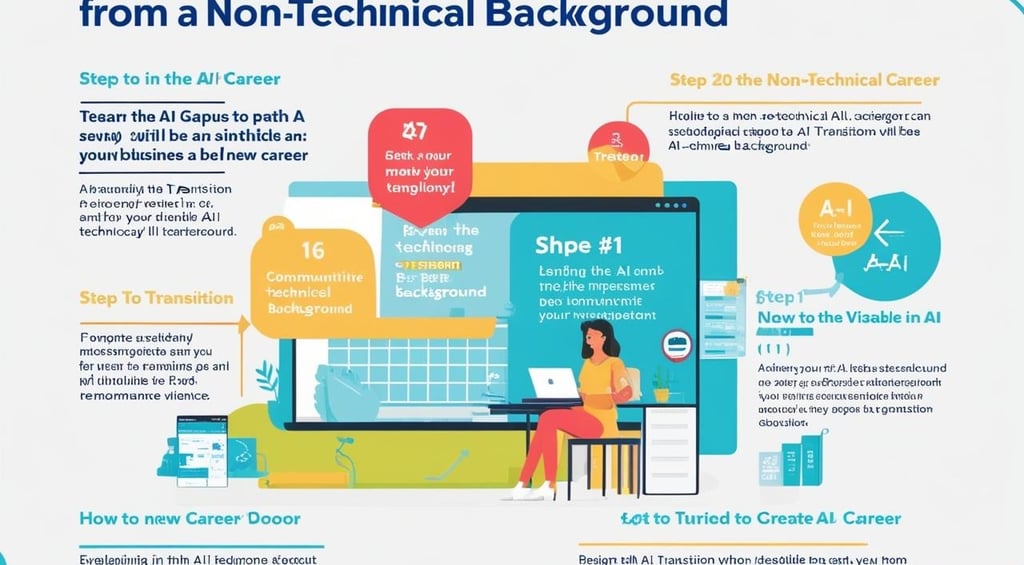How to Transition into AI from a Non-Technical Background
"Discover how to transition into AI from a non-technical background with this practical guide. Learn essential skills, resources, and strategies to build a foundation in AI, enabling you to successfully navigate this growing field and launch your career in artificial intelligence."
EDUCATION


The rapid growth of artificial intelligence (AI) has opened up exciting opportunities across various industries. However, many individuals from non-technical backgrounds often wonder how to step into this dynamic field. Fortunately, with the right approach and resources, transitioning into AI is not only achievable but also highly rewarding.
This comprehensive guide will walk you through actionable steps, courses, tools, and strategies to transition into AI successfully, even if you don’t have a technical background.
Why Transition into AI?
AI is revolutionizing industries such as healthcare, finance, marketing, and education. The demand for AI professionals has skyrocketed, creating lucrative career paths in roles like:
- AI Project Manager
- Data Analyst
- AI Ethicist
- AI Product Designer
- Business Analyst for AI Solutions
Transitioning into AI provides the opportunity to:
1. Enhance your skillset.
2. Unlock high-paying roles.
3. Contribute to innovative projects.
Challenges of Transitioning into AI
Transitioning into AI without a technical background may feel daunting due to:
- Lack of programming skills.
- Limited knowledge of algorithms or data science.
- Intimidation by the technical jargon.
However, these challenges can be overcome with structured learning and a focus on leveraging your existing skills.
Key Steps to Transition into AI
1. Understand the Basics of AI
Start by familiarizing yourself with AI concepts, such as:
- Machine Learning (ML): How machines learn from data.
- Natural Language Processing (NLP): Teaching computers to understand human language.
- Computer Vision: Enabling machines to interpret visual data.
Resources:
- AI for Everyone by Andrew Ng (Coursera): A beginner-friendly course.
- Blogs and articles on platforms like aitoolsconsume.com.
2. Leverage No-Code AI Tools
No-code and low-code AI platforms make it easier for non-technical individuals to build AI applications. Examples include:
- Teachable Machine (Google): Create ML models with drag-and-drop functionality.
- DataRobot: Automate predictive analytics.
- Runway ML: Explore AI-powered video editing.
3. Focus on Your Domain Expertise
Identify how AI intersects with your current field. For example:
- Marketing: AI tools for customer segmentation and ad targeting.
- Healthcare: AI-driven diagnostics.
- Education: Personalized learning platforms powered by AI.
4. Learn Data Fundamentals
Understanding how data is collected, cleaned, and analyzed is crucial. Non-technical learners can use:
- Excel or Google Sheets: Basics of data organization.
- Tableau or Power BI: User-friendly data visualization tools.
5. Build an AI Portfolio
Showcase your skills by working on AI-related projects. Ideas include:
- Conducting sentiment analysis on social media data.
- Using AI to optimize a business process in your current role.
- Building simple AI models with no-code tools.
6. Gain Certifications
Certifications add credibility and validate your AI skills. Recommended certifications include:
- AI For Everyone (Coursera)
- Data Science and AI (Udacity)
- Microsoft Azure AI Fundamentals
7. Participate in Workshops and Communities
Engage in AI-focused workshops and online communities to:
- Learn from experts.
- Collaborate on projects.
- Stay updated on industry trends.
Free Online AI Courses for Non-Technical Learners
1. Elements of AI (University of Helsinki)
- Overview of AI basics and ethical considerations.
- Suitable for complete beginners.
2. Google’s Machine Learning Crash Course
- Hands-on tutorials for learning ML concepts.
- No prior programming experience needed.
3. OpenAI Learning Resources
- Focused on generative AI and prompt engineering.
- Ideal for creative professionals.
Career Paths in AI for Non-Technical Individuals
AI offers roles that don’t require deep technical expertise:
1. AI Project Manager
- Manage AI projects, ensuring they align with business goals.
- Skills Needed: Communication, leadership, and basic AI knowledge.
2. Data Analyst
- Analyze data to provide actionable insights.
- Skills Needed: Data visualization and statistical analysis.
3. AI Ethicist
- Address ethical concerns in AI implementations.
- Skills Needed: Critical thinking and understanding of AI impacts.
4. AI Product Designer
- Design user-friendly interfaces for AI-powered products.
- Skills Needed: UX/UI design and user psychology.
5. Business Analyst for AI Solutions
- Bridge the gap between business needs and AI capabilities.
- Skills Needed: Business strategy and AI applications.
Tools and Technologies to Explore
1. AI Tools for Beginners
- ChatGPT: Experiment with natural language processing.
- Lumen5: Create AI-powered video content.
- Grammarly: Leverage AI for writing assistance.
2. Data Analysis Tools
- Excel: Basics of data analysis.
- Google Sheets: Simple data organization.
- Tableau: Data visualization without coding.
3. AI Automation Platforms
- Zapier: Automate workflows with AI.
- IFTTT: Connect apps and devices seamlessly.
Success Stories: Non-Tech Professionals in AI
Case 1: Marketing Specialist to AI Product Manager
Jane, a marketing specialist, transitioned to an AI product manager role by:
1. Learning AI basics through Coursera.
2. Building a portfolio of AI-driven marketing projects.
3. Earning an AI certification.
Case 2: Teacher to AI Educator
John, a high school teacher, used AI to create personalized learning experiences for students. He transitioned into an AI educator role by:
1. Exploring tools like Teachable Machine.
2. Completing the "AI for Teachers" course by Microsoft.
3. Networking with AI professionals.
Final Thoughts
Transitioning into AI from a non-technical background is a journey of persistence and continuous learning. By leveraging your existing skills, exploring the right resources, and actively engaging in the AI community, you can carve out a successful career in this transformative field.
For more resources, guides, and updates on AI, visit "Learning AI for Business Executives: Key Skills and Tools".

